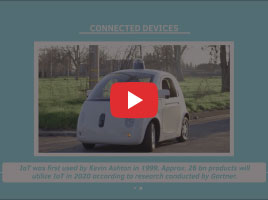Makino, a longtime IFS FSM customer, sees IFS IoT Business Connector as part of its service strategy. Here are the details of the development of Makino with the IFS IoT Business Connector, which provides many advantages:

Makino is a globally recognized company that produces metal-cutting and EDM machines. Like many product manufacturers, Makino is looking for new ways to differentiate itself through service. As such, the company is incorporating IoT, AI, and ML into its operations to enable the shift from reactive to predictive service. “This is a critical shift for Makino. It allows us to make support a competitive weapon,” says Mark Rentschler, VP of Customer Support at Makino.
Makino, a long-time IFS FSM customer, adopted the IFS IoT Business Connector as a part of its predictive service strategy. The IFS IoT Business Connector, a set of components that connect Microsoft Azure IoT Suite, or other discovery environments, to receive and operationalize device data and deliver observations to IFS business software. Along with proprietary AI and ML, Makino is able to monitor conditions of its machines and predict failures before they occur. In certain instances, when customers permit connectivity, the IoT Business Connector can feed data from the equipment directly into IFS FSM so that a call can be placed, or a ticket created automatically.
The solution works to determine product patterns and notify of issues prior to a failure occurring. Alerts can also be set to inform when preventative maintenance isn’t done properly or as scheduled. These insights help Makino not only to operate more efficiently, but to provide optimal equipment uptime for its customers.
CREATING NEW SERVICE REVENUE STREAMS
With large equipment like what Makino manufactures, downtime is incredibly costly and disruptive to customers’ operations. Further, in today’s service landscape customers simply expect minimal to no downtime and for the equipment they’ve purchased to just work, period. Of course, service providers know this is no easy feat and work to keep pace with increasing customer demands.
For Makino, the IoT-enabled OEE (overall equipment effectiveness) service offering not only enables the company to better meet its customer demands, but it also provides a new revenue stream for the company. This more sophisticated level of service that combines predictive analytics as well as equipment usage and operating data gives customers both insight and reliability that they are willing to pay a premium for, which is structured in the form of an annual subscription fee. “This solution provides more than just information and status updates, it really offers the ability to avoid failures that result in significant costs and disruption,” says Rentschler. “This value proposition is exactly what our customers want.”
Makino began development of this offering about a year and a half ago, and first introduced OEE to its customer base in September of 2018 with commercial availability February 2019. The company has seen immense interest from its customers with beta testing of the offering going very well. Makino anticipates this move to predictive service to create a long-term revenue stream that will augment its product and traditional service revenues.
MANAGING MAJOR CHANGE
Rentschler, who has been with Makino for more than 24 years, acknowledges that the move to predictive service is both a structural and fundamental shift. This transformation goes beyond the introduction of sophisticated new technology and reaches into the company’s culture, operations, and even business model.
“You have the introduction of technology itself, which requires our already electrically and mechanically skilled engineers to also become capable of networking,” says Rentschler. “With this being a new offering for our customers, you also have to consider the soft skills that are necessary to articulate the value and deliver on predictive service. These changes require continued communication and employee development – you can’t achieve full success without true collaboration.”
For a company that has traditionally provided products with break/fix service, the introduction of a subscription-based predictive service model is also a notable change. “For a company that sells capital equipment, the world of subscriptions with agreements, renewals, and the like is a significant adjustment,” says Rentschler.
While not without its challenges, Makino’s willingness to embrace the world of Servitization is commendable – too many organizations are hesitating because it is simply easier to do what they’ve always done. For those, though, Rentschler has some wise words. “Go fast, because you’re already late,” he says. “This is the future of our industry, so you either embrace it or you’ll be left behind.”







